
Is there any chance these guys are right ?
Is the Flat Earth theory worth considering ?
Since at least 2015, the theory of flat Earth has returned to the front stage of the Internet. What was considered - and is still mostly considered - a remnant of past ignorance, condemned to museums and history books, is now gaining momentum as a very serious Internet phenomena. Google Trends shows that, since 2012, “flat earth” and related requested grew by a whopping 800%. Black stars such as the rapper B.o.B..
(2016) or basket player Shaquille O'Neal (2017) hopped onto the boat by claiming they believed the Earth to be a disk rather than a globe (although O'Neal eventually backtracked).
The first time I stumbled on the flat Earth theory was in 2013. I was researching on Internet trolling as seen through the lenses of the academia. A paper mentioned the Flat Earth Society as an elaborate troll : purported flat-earthers would have actually crafted a wide decoy to trap the laymen into thinking they are serious and arguing with them. “Crackpot science”, the paper suggested, is often created by bored individuals trying to lure random people into pointless arguments. I shrugged and moved along.
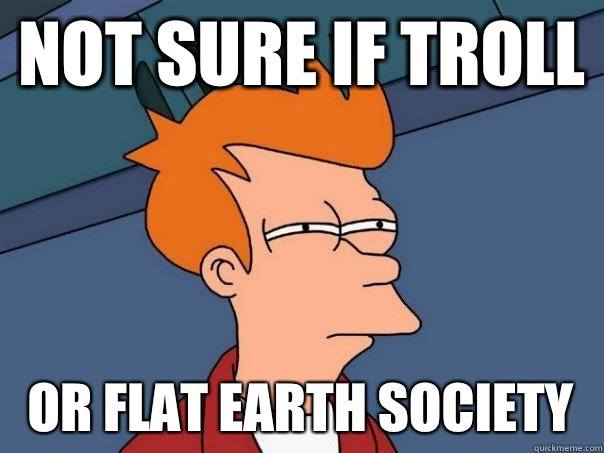
Later, when I embraced the red pill, I started thinking about the flat Earth theory as playing the same role than David Icke’s absurd stories of alien reptilians occupying key positions of power : namely, as controlled pseudo-opposition, likely created by the globalists themselves to discredit true causes and concerns by spurious association.
Did not Obama lump together skepticism towards the man-caused global warming scenario and belief in the flat Earth ? Former French prime minister Manuel Valls also associated, rather disingenuously, curiosity about the secretive Bilderberg Club to 9/11 conspiracy theories and even “Holocaust denial.” Believe whatever the globalists want to shovel down your throat, or you are a Nazi and a flat-earther! Yeah, sure.
More recently, I met with the friend of a friend who upheld the flat Earth. This guy traveled all around the world, speaks several languages and has extensive knowledge. His conversation was sound, very interesting, definitely red-pilled. I saw enough of him to know he is not the “tinfoil hat” many people would like to see. His belief seemed compelling enough to lead me to investigate into the flat earthers’ arguments. And then the surprise came: not only did their arguments actually make sense, but several clues from different fields I am familiar with begun to emerge - and point rather towards a flat Earth model than to the regular globe.
Grounds of doubt about the globe Earth
Watching and reading about the flat Earth cosmology, I started to realize, not that flatters are right but of how shaky the evidence for the mainstream view could be. Please note that the following is, by four-fifths, not arguments borrowed from flat-earthers but domains I tackled through studies and curiosity before having any interest in this issue. Perhaps this is the very reason why I started considering the issue as worthy of any attention at first : had there been no common ground, the flat Earth theory would have remained another strange Internet fad to me.
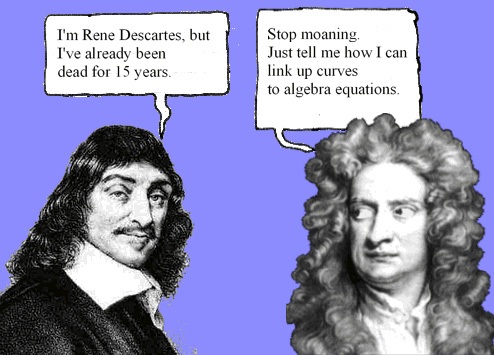
Descartes and Newton
The first domain of uncertainty I perceived was philosophical. The first to come up with a theory of universal attraction was not Isaac Newton (1643-1727), but French philosopher René Descartes (1596-1650), who theorized a fictitious universe where bodies would attract each other. Descartes’ physics was mathematical, consistent, and clean. It was also based on imagination and speculation rather than observation. Ultimately, it was proven false and discarded in favor of Newton’s cosmology.
Newton is often assumed to be the father of modern physics. He came up with the idea of universal attraction when an apple fell on his head, the popular story says; after which, he was vindicated by his friend Edmund Halley, who thanks to Newton’s theories correctly predicted the arrival of a comet now named after him.
Actually, the story is more complicated than that. Newton’s main book, the Principia Mathematica, devotes most of its space in elaborating abstract definitions and equations, after which it makes some predictions about celestial bodies that are - Newton says - supported by observation. The ideas, concepts, and equations come before observation, not after, and the latter is understood through the lenses of the former.
When Newton came up with his heliocentric, universal attraction model, he was widely criticized for introducing an “occult quality” at the heart of science. Why do bodies attract each other ? We don’t know why, Newton replied : we just know they do through observation and the best we can do is quantifying said attraction. Well, once you know the universal attraction was postulated rather than seen - celestial bodies prima facie behaving differently than earthly ones - the whole reflection becomes somehow doubtful and arbitrary.
As for the consistency and predictive power of Newtonian physics, these are proof that their maker was talented, but not that he was right : antique astronomer Ptolemy had successfully predicted celestial events for centuries to come... with a flat Earth model.
Who knows, then, if the following scientists did not remain used to build everything on assumptions that were far from evident ?
Esoteric clues

Mount Meru, Pole of the Earth according to Hindu/Vedic cosmology
The second field where doubts started bugging me was esoterical. (Granted, if you are a hardcore scientist and progressive, chances are you will find this wholly irrelevant, but someone who is red-pilled enough should be able to entertain doubts about most, if not all, modern idols.)
All ancient cultures share the same basic cosmology: the Earth is a flat disk, with on its middle a great tree of life or sacred mountain; the Sun and Moon revolve around the center - north - Pole; the firmament is a dome. Variations in detail, which can be interpreted as differences of emphasis in symbolism, hardly hide the stunning similarity of what everyone believed, from the lowest IQs to the greatest civilizations.
Everyone naturally suffers from the same bias, replies the smug scientist, and everyone falls for the same illusions. Only modern science could go beyond and lift the veil. Hmm, is that really so? If ancient civilizations were dumber than us or less developed, the argument would be sound, and it would fit nicely into a comforting narrative of progress. The problem is that several civilizations had a transcending, esoteric knowledge, which goes way beyond the seeming children stories and appears remarkably similar through space and time.
If the Earth was a flat disk, then we could understand why even modern esotericists consider the Pole as “superior” to the Sun : if the latter revolves around the former, and the former stretches higher than the latter, the “superiority” of the Pole makes sense. Astrology, with its idea of the arrangement of the stars affecting the newborn and associating with supernatural beings, also makes much more sense if instead of being scattered through universe the stars all revolve around the Pole.
In fact, God himself fits much better in a flat disk cosmology. If we believe that the Earth is a globe wandering inside a planetary system among numberless others, and that evolution explains life and everything else, then God comes across as the product of human imagination. But if the Earth is flat, Sun and Moon revolve around the Pole, and the firmament is a dome - then God and the supernatural become almost obvious.
Metapolitical issues

Adolfo Nicolas, current superior general of the Jesuits
The official version of history spins Copernicus, Galileo, Newton and the like into scientific heroes. Engaged into the Renaissance and Enlightenment, these characters were autonomous enough to think out of the box, make independent observations, and find the truth in spite of Catholic persecution. The Church was proven wrong and backwards; science and modernity triumphed. Fade to black, credits.
Once again, investigations show a more convoluted and compromising history than that. Copernicus was a cleric who never married. It is unknown whether he took the vows of not, yet it is known he was sought of by the Pope himself for advice on how to reform the calendar. Copernicus had long toyed with the heliocentric hypothesis. He was reluctant to publish it at all: he only issued a brief abstract after the Pope and other high-ranking clerics pressured him to do so. In 1533, another heliocentric made a lecture on the Copernician model to the Pope and was generously paid for that. But wait - wasn’t the scientific hero supposed to be persecuted by the ignorant Church ? Was Copernicus a hero at all, or a nerd who played with ideas and became a mouthpiece ?
In the 1530s, Ignacio de Loyola and others created the Society of Jesus. They were recognized as a religious order by Pope Clement VII, the exact same Pope who insisted, along with other Jesuit-related or Jesuit priests, that Copernicus published on heliocentrism. The Jesuits were, and still are, one of the most manipulative and cunning groups in the world. They were alive and well one century later, when Galileo, then a young philosopher, showed interest to the same field. Jesuits encouraged Galileo to publish as well: cardinal Bellarmine, in particular, pretended to order Galileo not to pester the Church... whereas he was secretly helping him to spread an already fashionable theory. Eventually, Galileo would end up scapegoated in trial, so that the profane would pity a seeming martyr of science, and when chroniclers made his name shine others were working behind the scenes.

Goodbye, flat Earth ! The globe is in fashion now.
During the eighteenth century, two expeditions took place to measure the Earth. They did nothing to prove or disprove Newton’s model. Instead, they took it for granted and only settled a dispute between two rival Newtonians. One of them, Pierre-Louis de Maupertuis, started with the assumption of “gravity towards the center” and expounded “Descartes’ and Newton’s systems.” All official debates at the time occurred between heliocentrics who grounded themselves on near-identical fashionable system. They merely reinforced a world that already existed inside their own chosen principles.
Once again, it is likely no chance that the big Enlightenment show coincided with reinforcing a theory that had no crucial experience ever confirming it. All celestial phenomena could already be explained and predicted from a flat Earth cosmology. Why, then, imposing another theory instead ? It is said that all physics has less principles when it is Newtonian rather than Ptolemaic or Aristotelian, and that modern physics is more compliant with Occam’s razor. Perhaps, but Occam’s razor proves strictly nothing and is valued because it leads to intellectual comfort, which does not necessarily means truth.
On the other hand, the new, heliocentric and later galactic cosmology, set the path to a world with no God, no spiritual principle(s), no purpose, where properties inexplicably “emerge” from no previous principle and where people must invent their own purpose. Well, perhaps all of this is dumb luck. But perhaps it isn’t.
Epistemological skepticism

In philosophy, epistemology is the study of knowledge. Science obviously falls under the head of epistemological questions. If one investigates into what the humanities say about hard sciences, one will find a lot of leftist BS, but also valuable arguments that call us not to trust the established science of today too blindly. Science is made less of experiences than of theories and sometimes fashions : epistemologists like Karl Popper, who sought criterion like falsifiability to distinguish the “really scientific” theories from the unscientific, tried to correct science as to make it closer to what it should be. Gaston Bachelard showed how the theories hold true today needed the discarded theories of yesterday to appear, whereas Thomas Kuhn upheld the importance of pre-established paradigms in determining outward observation.
This could be interpreted as a proof of continuous progress. But it is not: as Richard Lynn noticed, truer theories have already been rejected in favour of make-believe stuff. The biological and sound understanding of race and sex has been banned to let room to neo-Marxist babble. Who knows if this did not already happened even before Leftism was born ?

The red pill does not always mean a brutal, sudden realization of the truth, but is more akin to a process of realization and understanding. There are stages, steps, inside the process of red-pillization. The more one becomes red-pilled, the more one is able to entertain doubt about whatever has become the System. We know human global warming is a scam, 9/11 was likely, an inside job, the USSR was funded by capitalists, the Fed was a big plan to control the economy through a monopoly over money printing, and there are serious doubts about the very possibility of “Nazi” gas chambers and crematoriums - doubts that are brutally repressed.
We know as well that the deep State exists, that the enormous wave of immigrants invading Europe is not caused by war in Syria, that the deep State is in bed with ISIS and that the push for “gender” is definitely no chance.
The shadowy elite has been able to craft masterful plans most people cannot even imagine, scammed everyone through a number of ways - at least they have been creative - and can maintain the lid on its self-chosen version of history for decades. Who knows if all this did not start at the very dawn of modernity ?
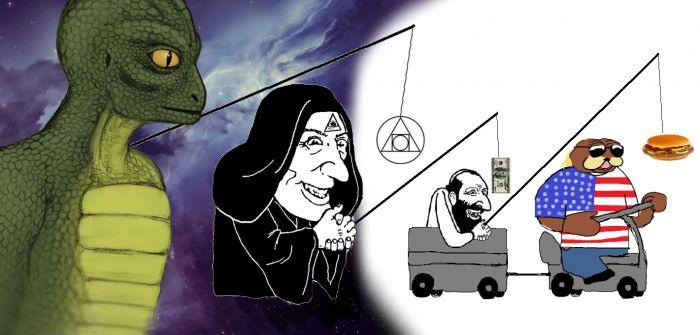
If we remove the reptilian guy, this may be less far-fetched than we thought''
“But this is ridiculous ! Gravity is obvious, it isn't a social construct!”
So far I have conspicuously avoided the physical arguments. I did so because I approached the flat Earth issue from other lines of thought, namely, the ones explained above. It could be said that all these is just a bundle of evidence whose value is difficult to assess. It could also be claimed that none of these has any weight when compared with what we know: centuries of technological progress, space missions, and common sense. Could a very shadowy elite impose a false cosmological model for centuries ? Are thousands of astronomers constantly hiding the truth ? And what about the astronauts who went to space ? Not to mention the consistency of scientific knowledge as a whole. Given how obvious and common-sensical the case seems, isn’t skepticism itself outrageous ?

An undeserving token who confuses free fall with Newtonian gravity theory. Still thinks he's better than B.o.B.
Well, not as much as you likely think. I went through Eric Dubay’s 200 Proofs Earth Is Not A Spinning Ball and, frankly, the arguments are far from stupid.
One of them is about how we never perceive the curvature of the Earth. According to simple geometry, if Earth is a globe, then we should at some moment start to perceive its curvature. It should be especially true on “flat” surfaces such as canals without locks or large lakes, both having no tides. Well, they say, curvature can never be noticed or found no matter how one tries to find or observe it. Distant objects that should be hidden behind the curvature can still be seen with a telescope.
The curvature is never taken into account by engineers, pilots, or navigators. Engineers use a flat Earth model to build long roads or canals. Navigators use plane trigonometry and seem to err repeatedly if they use globe trigonometry to calculate their relative position. This seems strange - applications should be deduced from the most fundamental principles, not bound to ignore them.
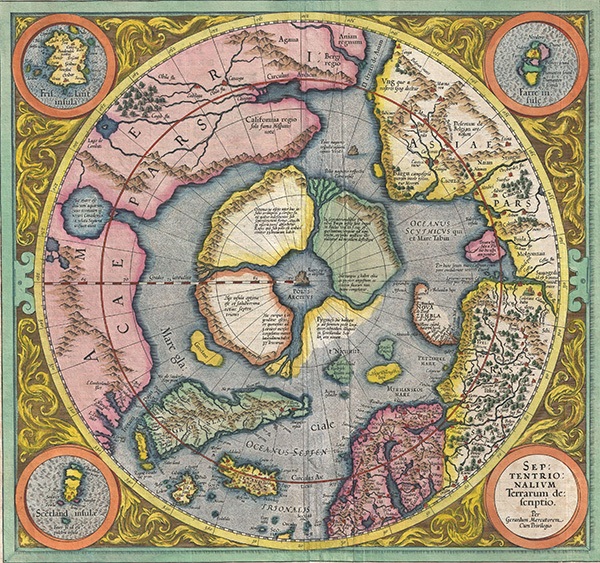
Mercator's view of Antarctica
There seem to be other mysteries around air corridors, as no plane really seem to cross the southern oceans as it should on a globe, and the GPS tracking system shows systematic glitches on the few southern flies that purportedly do not cross the northern hemisphere. Some exploration missions also seem shrouded in mystery : James Cook and other famous captains needed years to circumnavigate Antarctica; admiral Byrd went there with a powerful, top-of-the-edge fleet, for seemingly no reason; Antarctica also said to brim with coal, uranium, gold and other natural resources but has been completely shut down and cannot be accessed, even by the wealthier corporations.
The flat Earth perspective would also explain a rather puzzling choice from NASA. Instead of pursuing its enthralling program of space exploration, the world-famous organization chose to divert its push to BS “equality” program. How could it be ? Well, if the Earth is flat and NASA is in charge of hiding it, these otherwise appalling choices make much more sense.

As for physics, the Newtonian-Einsteinian model may be far from evident. Free fall has been known since the dawn of times. Objects fall to the ground - literally the most down-to-Earth observation one can ever make. Yet Newtonian and Einsteinian physics are relatively recent. They are, actually, modern artifacts, independent from empirical observation. The nuclear bomb and modern truths on subparticles do not need relativity to be true. (If they do, this needs to be proved.) We know that Galileo falsified his own measures of falling objects, likely because he was aiming at putting together the abstract toys of his mathematical theories rather than observable phenomena.
As for more recent times, science has been scattering itself endlessly into multiple specialties where everything else is more or less taken for granted. Compartmentalized information, working on overly abstract theories, and the pre-processing of any observation through seemingly obvious but actually pre-conceived ideas, could explain the failure of generations of astronomers to really know whether the small lights above are faraway Suns or right behind a dome.
What do the mainstream answered ? Well, most “debunkings” I have seen seemed rather dishonest. One of them cherrypicks among flat-earthers’ objections and answers them by putting them into the mainstream newtonian-einsteinian physics... which is actually being questioned. In other words, the “debunking” is actually begging the question, and this one lies at least once by claiming that the faraway, no-curvature view is a rare phenomena whereas it can be found repeatedly. Another one makes a straw man of the flat Earth model, loads it with whatever numbers it wants, and eliminates it - a method strangely close from the straw men theories of race that dishonest academics produced as to ban a relevant, justified concept.
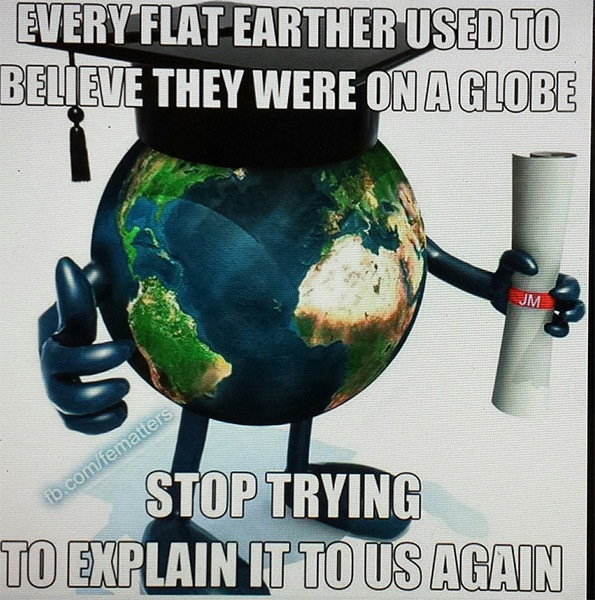
I feel the same when libtards pretend to “explain” to me the very BS I distanced myself from
Is the flat Earth model the vanguard of the red pill, or a BS fad ?
All this does not prove flat-earthers to be right. It does not prove, though, that they are dead wrong and tinfoil hats as the mainstream wants them to be. For years I have considered the very idea of a flat Earth stupid and let it with no thought given. Now, having become accustomed to think out of the box, to find inspiration in non-modern sources, and to look warily to whatever view the System wants us to entertain... not so much.
As the Scottish philosopher David Hume wrote, “a wise man proportions his belief to the evidence.” To be honest, I consider having no evidence to either laughingly reject the flat Earth model, or embrace it and claim I reached a new peak in understanding. I could not argue on an equal footing with a high-level physician or astronomer on the issue, yet I know many complicated equations are indeed theoretical artifacts created for deception : Keynesian economic models are tiny and neat on paper, but ultimately rest on false assumptions and ignore a number of factors.

Thus, I choose what many philosophers chose throughout the centuries when they grappled with such unsure topics : epoche, suspension of belief. Is the Earth round or a ball ? As the Hollywood philosopher George Clooney almost said, “it doesn’t change a thing.”
Whites do not need Apollo missions to confirm the outstanding value of Western civilization. The red pill does not need to consider cosmology to struggle for known, sure truths, and defeat very real evil enemies. If you don’t have time or interest for a complicated cosmology issue, feel free to move on. There is plenty to do without arguing about where the Sun and Moon are really located. If you do, however, I advise you to at least read Dubay’s 200 Proofs, a clear, well-explained synthesis of flat-earth arguments.
Clearly, the Internet and metapolitical struggle have not finished surprising us.
Flat Earth - PDF



